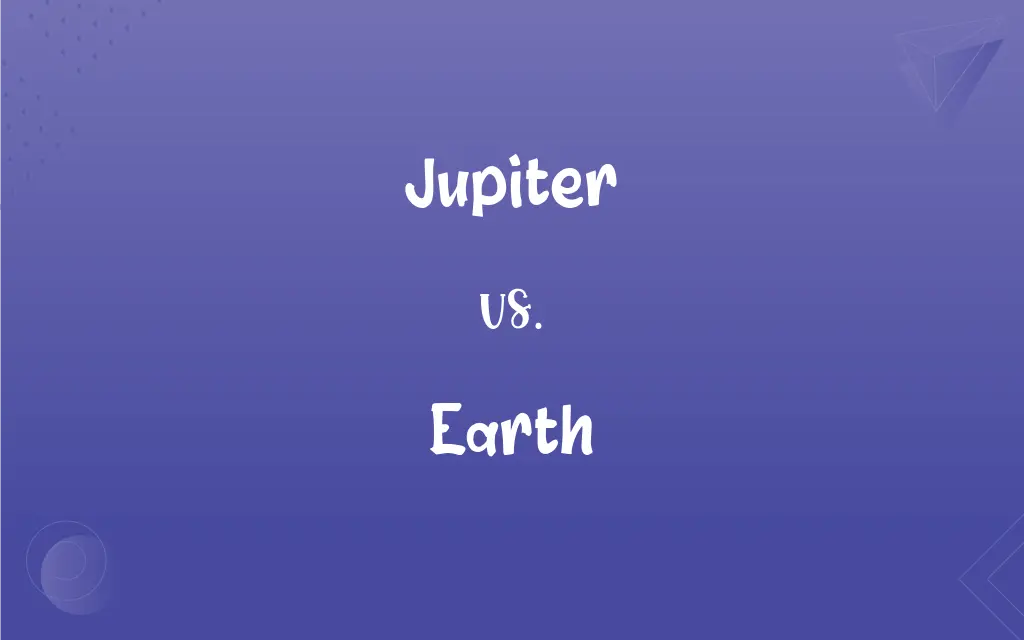Jupiter vs. Earth: What's the Difference?
Edited by Aimie Carlson || By Harlon Moss || Published on July 26, 2024
Jupiter is the largest gas giant in the solar system with a strong magnetic field and numerous moons, while Earth is a rocky planet with a solid surface, abundant water, and a diverse biosphere.

Key Differences
Jupiter is a gas giant, primarily composed of hydrogen and helium, with no solid surface, whereas Earth is a terrestrial planet with a solid crust, mantle, and core, primarily composed of silicate rocks and metals.
Jupiter is the largest planet in the solar system, with a diameter about 11 times that of Earth, and a mass over 300 times greater. Earth, in comparison, is the fifth-largest planet and the largest of the terrestrial planets.
Jupiter has a very strong magnetic field, about 20,000 times stronger than Earth's, and a distinctive feature is its Great Red Spot, a giant storm larger than Earth. Earth's magnetic field is weaker but crucial for protecting life from solar radiation.
Earth has a relatively thin atmosphere composed mostly of nitrogen and oxygen, while Jupiter's thick atmosphere is composed mainly of hydrogen and helium, with traces of other gases like methane and ammonia.
Jupiter has a system of rings and over 79 known moons, including four large Galilean moons. Earth has one natural satellite, the Moon, which is the fifth-largest moon in the solar system.
ADVERTISEMENT
Comparison Chart
Type
Gas giant
Terrestrial planet
Diameter
About 11 times Earth's
About 12,742 km
Composition
Mostly hydrogen and helium
Mostly silicate rocks and metals
Atmosphere
Thick, hydrogen and helium
Thin, nitrogen and oxygen
Magnetic Field
Very strong
Relatively weak
ADVERTISEMENT
Moons
Over 79, including 4 large moons
1 (the Moon)
Surface Features
Great Red Spot, no solid surface
Mountains, oceans, continents
Rings
Yes, faint
No
Life
No known life
Diverse biosphere
Orbital Period
About 12 Earth years
1 Earth year
Jupiter and Earth Definitions
Jupiter
Jupiter is known for its distinctive features, such as the Great Red Spot and its system of rings.
The Great Red Spot on Jupiter is a giant storm that is larger than Earth.
Earth
Earth's atmosphere is composed mainly of nitrogen and oxygen, with trace amounts of other gases.
The ozone layer in Earth's atmosphere protects us from harmful ultraviolet radiation.
Jupiter
Jupiter is the largest planet in the solar system, known for its gas composition and strong magnetic field.
Jupiter's Great Red Spot is a massive storm that has been raging for centuries.
Earth
Earth is the third planet from the Sun and the only known planet to support life.
Earth's atmosphere is crucial for sustaining life by providing oxygen and protecting us from harmful radiation.
Jupiter
Jupiter is the fifth planet from the Sun and takes about 12 Earth years to complete one orbit.
Jupiter's orbit influences the orbits of other objects in the solar system, including asteroids in the asteroid belt.
Earth
Earth has a diverse biosphere, with millions of species of plants, animals, and other organisms.
The Amazon Rainforest on Earth is home to a vast array of biodiversity.
Jupiter
Jupiter has a strong magnetic field and numerous moons, including the four large Galilean moons.
Jupiter's magnetic field is so strong that it extends far beyond the planet, creating a magnetosphere.
Earth
Earth has a solid surface with continents, oceans, and various geographical features.
Mount Everest is the highest point on Earth's surface.
Jupiter
Jupiter is a gas giant with a thick atmosphere primarily made of hydrogen and helium.
The Galilean moons of Jupiter were discovered by Galileo Galilei in 1610.
Earth
Earth has a natural satellite, the Moon, which influences tides and has been visited by humans.
The Moon's gravitational pull causes the ocean tides on Earth.
Jupiter
Roman Mythology The supreme god, patron of the Roman state and brother and husband of Juno. He came to be identified with the Greek Zeus.Also called Jove.
Earth
The land surface of the world.
FAQs
What is Earth?
Earth is the third planet from the Sun, known for its solid surface, diverse biosphere, and ability to support life.
What are the main components of Earth's atmosphere?
Earth's atmosphere is mainly composed of nitrogen and oxygen.
What are some distinctive features of Jupiter?
Some distinctive features of Jupiter include its Great Red Spot, strong magnetic field, and system of rings.
What is Jupiter?
Jupiter is the largest planet in the solar system, known for its gas composition, strong magnetic field, and numerous moons.
What are the main components of Jupiter's atmosphere?
Jupiter's atmosphere is primarily made of hydrogen and helium.
Does Jupiter have a solid surface?
No, Jupiter does not have a solid surface; it is a gas giant.
What are some distinctive features of Earth?
Earth has a solid surface with continents, oceans, and a diverse biosphere.
How many moons does Jupiter have?
Jupiter has over 79 known moons, including the four large Galilean moons.
Does Jupiter have a magnetic field?
Yes, Jupiter has a very strong magnetic field.
How do Jupiter and Earth differ in size?
Jupiter is about 11 times the diameter of Earth and has a mass over 300 times greater.
Is there life on Earth?
Yes, Earth has a diverse biosphere with millions of species of living organisms.
What is the significance of Jupiter's Great Red Spot?
The Great Red Spot is a giant storm on Jupiter that has been raging for centuries, showcasing the planet's dynamic weather.
How many moons does Earth have?
Earth has one natural satellite, the Moon.
What is the orbital period of Jupiter?
Jupiter takes about 12 Earth years to complete one orbit around the Sun.
Does Earth have a magnetic field?
Yes, Earth has a magnetic field, but it is relatively weak compared to Jupiter's.
Can life exist on Jupiter?
There is no known life on Jupiter, as it lacks a solid surface and has extreme atmospheric conditions.
What role does Jupiter's magnetic field play?
Jupiter's magnetic field creates a vast magnetosphere that protects the planet from solar radiation and influences its moons.
What role does Earth's magnetic field play?
Earth's magnetic field protects the planet from solar radiation and helps maintain the atmosphere.
What is the significance of Earth's ozone layer?
Earth's ozone layer is crucial for protecting life from harmful ultraviolet radiation and maintaining the planet's climate.
What is the orbital period of Earth?
Earth takes one year to complete one orbit around the Sun.
About Author
Written by
Harlon MossHarlon is a seasoned quality moderator and accomplished content writer for Difference Wiki. An alumnus of the prestigious University of California, he earned his degree in Computer Science. Leveraging his academic background, Harlon brings a meticulous and informed perspective to his work, ensuring content accuracy and excellence.
Edited by
Aimie CarlsonAimie Carlson, holding a master's degree in English literature, is a fervent English language enthusiast. She lends her writing talents to Difference Wiki, a prominent website that specializes in comparisons, offering readers insightful analyses that both captivate and inform.






































































